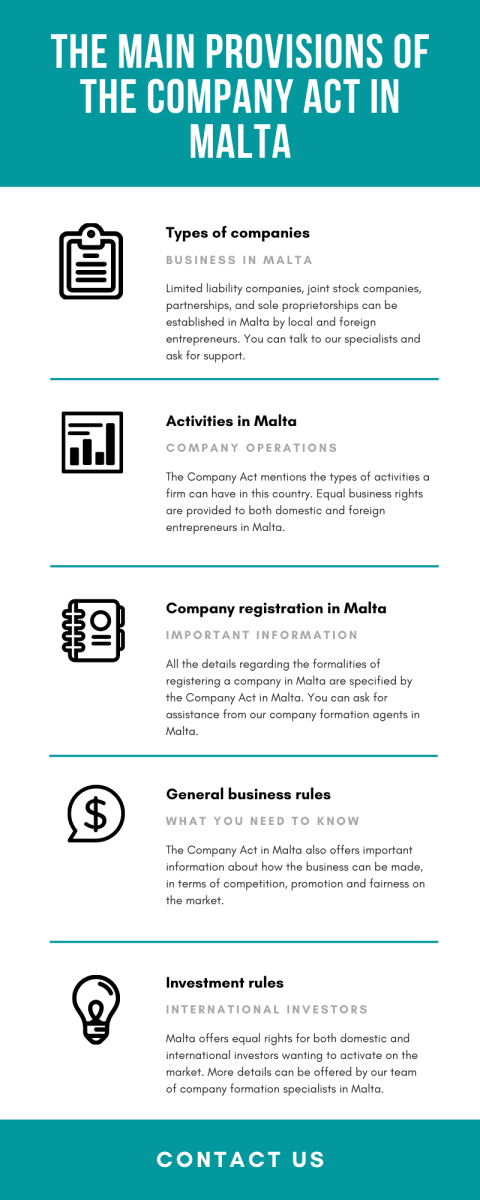The Company Act in Malta is actually based on the Company Law of the United Kingdom. It mainly concerns civil matters rather than common law. The first Company Act in Malta was called the Commercial Partnerships Ordinance and it was replaced in 1995 with the new legislation. Companies in Malta had to transform their structures according to the new Company Act in Malta and register with the Registry of Companies in Malta. In matters of company incorporation in Malta, it is best to talk to one of our company formation specialists in Malta who can guide foreign investors to set up their businesses in this country.
| Quick Facts | |
|---|---|
| Act name | Companies Act (Cap. 386) 1995 |
|
Legal framework |
Maltese law |
|
Regulator |
Registrar of Companies (Malta Business Registry) |
| Company registration process | Through the Malta Business Registry |
| Main company types |
Limited liability company (LLC), partnership, sole proprietorship, branch |
| Audited financial statements |
Required for private companies as per Company Act in Malta. |
| Accounting standards |
Generally Accepted Accounting Principles (GAAP) |
| Corporate income tax |
35% |
| Share transfers |
Permitted with certain restrictions |
| Merger and acquisitions | Regulated by the Competition and Consumer Affairs Authority |
| Foreign ownership |
Permitted with certain restrictions |
| Regulatory compliance |
Oversight by the Maltese Financial Services Authority (MFSA). |
| Reporting currency |
Euro (EUR) |
| Trading on the Malta Stock Exchange |
Possible for public companies as per Company Act in Malta |
| Enforcement of contracts | Legal system based on Roman-Dutch law |
The European principles comprised by the Company Act in Malta
As part of the European Union, some rules in the Company Act in Malta also follow the principles of the European directives, just like all other member states. These rules are found in the text of the Company Act 1995 in Malta. Foreign investors who wish to come to Malta and set up a company must be aware of the requirements of each type of structure and only after that they should decide and choose the type of business that best suits their interests. Anyway, limited liability companies are the most common forms in Malta, either as private companies or public companies. Here is an infographic with extra details:
The Employment Law in Malta
As far as the Employment Law in Malta is concerned, it is related to the Company Act in Malta. The rules of the Labour Law in Malta are included in several texts. For instance, the legislation regarding the employment can be found in the Conditions of Employment Act, the Industrial Relations Act, the Employment and Training Services Act or the Social Security Act. All the main acts concerning the Labour Law regulate the relationship between employer and employee, mention both the oral and the written contract of employment and stipulate the duties and obligations of the employer and the staff in a company in Malta. All these must be in accordance to the Company Act in Malta as well.
The video below offers information about the Maltese Company Act:
What are the provisions of the Company Law in Malta?
The Company Law in Malta contains the Malta Enterprise Act, the Business Promotion Act, the Competition Act, the Companies Act Regulations on Fees and the Co-operatives Societies Act. All these sets of laws comprise complete information about how business is made in Malta, the management of companies and related concerns for both local and foreign investors.
What types of companies fall under the Company Law in Malta?
The Company Act in Malta regulates the limited liability companies (private or public), offshore companies, partnerships (limited or general), and sole proprietorships. For any of the above-mentioned types of businesses, our team of advisors in Malta can offer assistance at the time of incorporation and related services for a fast and proper start on the market.
How can I open a Maltese LLC?
Limited liability companies can be easily established in Malta and are subject to fast incorporation and formation. With EUR 1,200 as the minimum share capital, two or more shareholders not exceeding 50 can form a private limited liability company in Malta. As for the public limited liability company in Malta, this can be established with a minimum share capital of EUR 47,000 deposited in a local bank account. The Articles of Association or the Articles of Incorporation stand at the base of forming a Maltese limited liability company and comprise information about the owner, their nationality, the rules of the company, the activities, the business address, the appointed representative and the board of managers. A Maltese LLC needs to be registered for tax and social contributions purposes in order to activate on the market. It is good to know that the incorporation of a limited liability company in Malta can be made within a few days, with the help of the Maltese Registry Companies, the authority in charge. Instead of dealing on your own with the company registration process in Malta as a foreign investor in this country, it is recommended to have the assistance and guidance of our company formation agents in Malta. They can handle all the formalities and offer you in-depth support throughout the entire incorporation process of a Maltese LLC. They can also help you register for VAT in Malta.
Establishing a branch in Malta
Large companies from abroad can have branches in the insular state and can benefit from a wide range of advantages, facilities and tax exemptions where it is the case. There is no need for a minimum share capital upon branch registration in Malta, but a declaration stating the intention of opening such an entity must be issued by the foreign company. The limited liability company is the proper business form through which a branch can be established in Malta, and the incorporation can commence with the Maltese Registry of Companies by submitting the required documents. Maltese branches are subject to varied advantages, among which, no withholding taxes on royalties and interests. Foreign company owners interested in opening branches in Malta should solicit assistance and support from one of our company formation representatives in Malta who can deal with the registration process alongside other important steps in company formation.
Subsidiaries in Malta
According to the Company Act, subsidiaries of large companies from abroad are accepted in Malta and are normally established by large enterprises. The main advantage of a subsidiary in Malta is the independent status compared to a branch, information mentioned by the Company Act. Subsidiaries can also run under the rules of a public or private limited liability company, mentioning that the Memorandum and the Articles of Association need to comprise information about the owners, the activities, the registered office, the share capital, the name of the appointed representative, the date of formation. The minimum share capital of a subsidiary needs to be deposited in a local bank account. Just like in the case of any type of entity, subsidiaries need to be registered for tax purposes and need to align with the accounting requirements. The process of a subsidiary formation might prolong, but it is suggested to ask for support in terms of documents from our consultants.
The purposes of firms as stipulated by the Company Act in Malta
Foreign entrepreneurs can easily set up a company in Malta in any field of business, in agreement with their plans, purposes, and activities. Among the operations and objects a business can have the following are stipulated by the Company Law in Malta:
- companies can perform e-commerce activities, and carry out online betting and gaming activities under a license in this sense;
- firms in Malta can offer licensed investment services and can receive brokerage incomes or related commissions;
- a business in Malta can have its own trademarks, copyrights, and patents;
- there is no restriction for holding particular assets in the company, as they are all accepted.
How to establish a holding company in Malta
Holding companies in Malta are flexible and can be established by both domestic and foreign entrepreneurs interested in holding intellectual property rights, securities, shares, or real estate assets. Such companies can run under the rules of limited liability companies, as stated by the Company Act in Malta. According to the legislation of Malta, owning 10% in company shares comes with different rights, like voting, distribution of assets in case of company dissolution, distribution of profits, and many more. The scope of a holding company in Malta must be correctly established from the start, in accordance with the owners’ business ideas and intentions. Please feel free to talk to our specialists and find out more about the registration of holding companies in Malta.
Company relocation in Malta – Is this possible?
Yes, entrepreneurs from overseas can easily relocate their companies in Malta respecting a few important requirements. The entire process starts with a series of documents that must be prepared, such as a declaration with the intention of company relocation (signed by two administrators), a resolution that shows the company can be relocated, a copy of the Articles of Association, and the Certificate of Good Standing issued in the country where the company was registered.
It is important to note that the company relocation must be announced to the authorities in the home country, in order to start the de-registration process. Once these steps are concluded, the relocation of a company in Malta can commence. This is not a complicated process, but you should talk to our company formation agents in Malta and solicit complete support for company relocation in Malta. We can handle all the formalities and documents.
Liaison office in Malta
The liaison office in Malta has strict rules and regulations and cannot perform financial activities. The functions are quite clear and refer to varied promotional and marketing operations, plus the development of relations and collaborations with potential clients in Malta. The registration of a liaison office in Malta requires, according to the Maltese Company Act, a notarized form of the company documents are solicited, plus two letters stating the authorization of the representative of the liaison office and the objective of such structure, signed by the managers of the foreign company.
Liaison offices in Malta can have employees if the foreign company agrees on this aspect. Moreover, a liaison office cannot sign contracts, but all the aspects can be explained by one of our company incorporation agents in Malta.
FAQ about companies in Malta
According to the Company Act in Malta, foreign entrepreneurs can register limited liability companies, joint-stock companies, partnerships, and sole proprietorships. Large companies can decide on branches and subsidiaries in Malta.
EUR 1,200 is the minimum share capital of limited liability companies in Malta that must de deposited in a local bank account. At least two members can form a limited liability company, respecting the formalities and obligations imposed by the Trade Register in Malta.
Yes, the Maltese Company Act mentions all the conditions of the registration of subsidiaries and branches in this country. You can talk to our specialist and receive all the needed information referring to the incorporation of branches and subsidiaries in Malta.
The Articles of Association are the main documents of a company in Malta. These must comprise information about the owners, the activities, the general rules of the firm, the business address, the name of the representative, etc. Our agents can prepare the documents for your firm in Malta and can help you register it with the entitled authorities.
Yes, shelf companies or vintage companies can be purchased by entrepreneurs from abroad, in a few simple steps, and helped by one of our company formation agents in Malta. Once the ownership transfer is concluded, you can simply start the activities of your firm purchased in Malta. Ready-made companies come with a series of advantages that can be entirely explained by one of our specialists.
Making investments in Malta
The appealing business sectors in Malta provide a wide range of opportunities for both local and international investors interested in generating profits. Citizenship by investment scheme enjoys the expected success among international investors in Malta. The Maltese residency is offered in exchange for a substantial economic contribution to the country. Making investments in the real estate sector or government bonds comes with attractive advantages, among which, visa and residence in Malta. Also, the tourism sector is extremely appealing to foreigners looking for a business in the insular state. Below you can find some facts and details about the investments and economy in Malta:
- There are more than 200 international companies registered in Malta.
- The total FDI stock registered in Malta in 2018 was of around USD 206,000 million.
- 2019 Doing Business report shows the position of Malta among worldwide economies: 84.
- Most of the FDIs recorded in 2018 in Malta were directed to the financial and insurance sectors.
The Company Act mentions that both local and foreign entrepreneurs have equal business rights, plus varied privileges and facilities to stimulate the investments. No matter if you are interested in company incorporation in Malta or if you want to know more about the business regime for investors from abroad, our consultants can cater to your needs at any time. Please feel free to contact us as soon you decide for business registration in Malta.
We can also help you with the incorporation of companies in Lithuania, Japan, Hong-Kong, Singapore. For our clients who speak Russian and are interested in company formation in Malta, we offer them the possibility to read more at this procedure.



